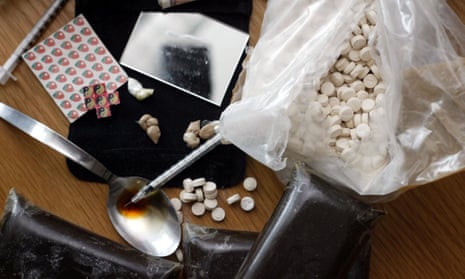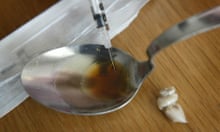Scotland’s drug-related death toll has increased by 27% over the past year to reach a record high of 1,187, putting the country on a par in terms of the fatality rate per capita with the United States, where synthetic opioids such as fentanyl have devastated drug-using populations.
The death rate is now more than three times that of England and Wales, and has more than doubled since 2008, when there were 574 deaths. It is higher than any other EU country.
According to the latest annual figures, published on Tuesday morning, most of the increase in fatalities was in the over-35 age-group, the so-called “Trainspotting generation” of ageing, long-term users, although there was also a rise in deaths among younger people.
Heroin, methadone or codeine were implicated 86% of deaths. “Street” benzodiazepines, such as etizolam, which have flooded the market across the UK over the past few years, were implicated in 57% of the deaths.
The figures come as the Scottish government renews calls for more powers to be devolved to Holyrood which it believes will allow it to take measures required to halt the fatalities. Drugs legislation, including the Misuse of Drugs Act, is currently reserved to Westminster, which has resisted initial attempts to relax the law north of the border.
Growing cross-party concern around what public health minister Joe FitzPatrick calls an “emergency” has been accompanied by increased momentum around legislative change, including the relatively minor amendments required for a medically supervised drug consumption room in Glasgow, which the Home Office has refused to sanction.
Following a lengthy investigation, the tabloid the Daily Record backed decriminalisation in an editorial earlier this month, while one of Police Scotland’s most senior police officers, described the Misuse of Drugs Act as a relic that was “ripe for reform”.
Giving evidence to the Scottish affairs select committee, which is currently undertaking its own inquiry into problem drug use in Scotland, in early July, assistant chief constable Steve Johnson pleaded with politicians to have “confidence and courage” to decriminalise, as well as underlining his support for drug consumption rooms.
Speaking to the same committee last week, Scotland’s highest law officer, the lord advocate James Wolffe, QC, suggested that some de facto decriminalisation was already taking place, confirming that in cases of simple possession he advises prosecutors to keep users out of the justice system.
The newly appointed chair of the Scottish government’s task force on drug deaths, Catriona Matheson, told the Guardian that as well as considering international evidence around decriminalisation and de facto decriminalisation, she would also investigate challenges around treatment services and stigma.
“I understand why decriminalisation grabs most attention, but legislation, criminal justice, healthcare and public attitudes are intertwined,” Matheson said. “The public mood is changing but there’s still a need to inform people about the reality of addicts’ lives, and we need more sensitive reporting.”
A range of factors have contributed to the steady rise of drug fatalities in Scotland. Drug counsellors and campaigners blame a “perfect storm” of more people using multiple drugs at the same time, including those already being prescribed substitution treatment such as methadone, unpredictably strong prescription drugs flooding the market, and decades-long addicts in already fragile health.
Drug use, and the numbers of deaths associated with it, has been significantly higher in Scotland than the rest of the UK since the heroin epidemic of the 80s and early 90s. Scotland has also seen more depressant-based substance abuse, including alcohol, which carries a greater risk of fatalities.
Experts point out that today’s figures also indicate a smaller but significant increase in deaths amongst under-35s, who are more likely to overdose because of poly-drug use, including the newly available “street benzodiazepines”.
At the beginning of the year, local outreach workers linked an unprecedented rise in the number of deaths of homeless people in Glasgow to illegal versions of prescription tranquillisers.
Dr Carole Hunter, lead pharmacist for addiction services at the city’s health and social care partnership, which had the highest rate of fatalities in 2018, said: “The major problem for Glasgow is heroin and illicit benzos like etizolam or street valium, which have never been cheaper or more available. People buy it online, in huge quantities, and unknown quality. You could take 10 one day and be fine, and the next day take the same amount and overdose.”
Hunter is working towards the opening of enhanced drug treatment centre in Glasgow later this year, the first clinic of its kind in the UK to administer medical grade heroin to addicts under strict supervision.
Findings from international trials now suggest that the supervised use of medicinal heroin can be an effective alternative treatment for the small minority of entrenched opioid users who fail to respond to mainstream substitution therapy using methadone or buprenorphine.
Hunter also believes that Glasgow’s addict population needs a drug consumption room, which is championed by the city’s council as well as its SNP and Labour MPs. “Remember that a drug consumption room is much more than a place to inject safely; it offers healthcare, advice and support.”
Some campaigners caution that drug policy must not be overshadowed by political wrangling about Westminster intransigence, while others point to the opportunities for radical improvements within the existing law.
Roy Robertson has been a GP in Muirhouse, where Trainspotting was set, since 1980 and is now professor of addiction medicine at Edinburgh.
“Despite all theses political diversions, clinical services remain fragmented and poorly supported. The new GP contract has not helped and the culture of low doses of treatment in NHS services remains a problem that generates the unintended consequence of self-medication with other drugs.”
The problem of “sub-optimal dosing” is familiar to Dave Liddell, chief executive, Scottish Drugs Forum, who describes a “very rigid” model “which punishes people with reduced doses for not turning up to appointments or discharges them entirely”.
“Neither decriminalisation or one drug consumption room in Glasgow is going to impact substantially on the death rate. The key focus needs to be on improving on improving our drug treatment and care services. We need to look at access to opioid replacement therapy. Only 40% of people with a drug problem in Scotland are currently in treatment, compared with far higher numbers in England and many countries in Europe.”










